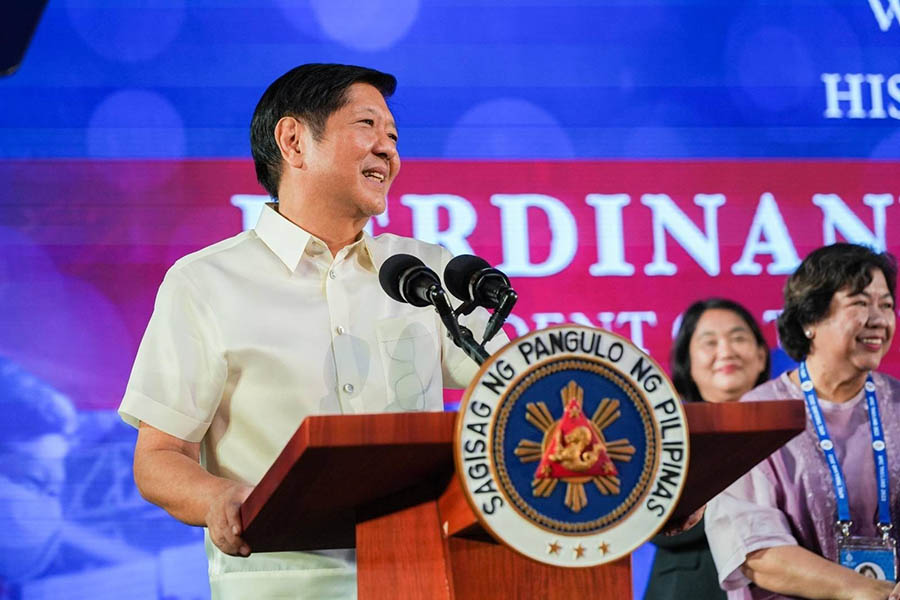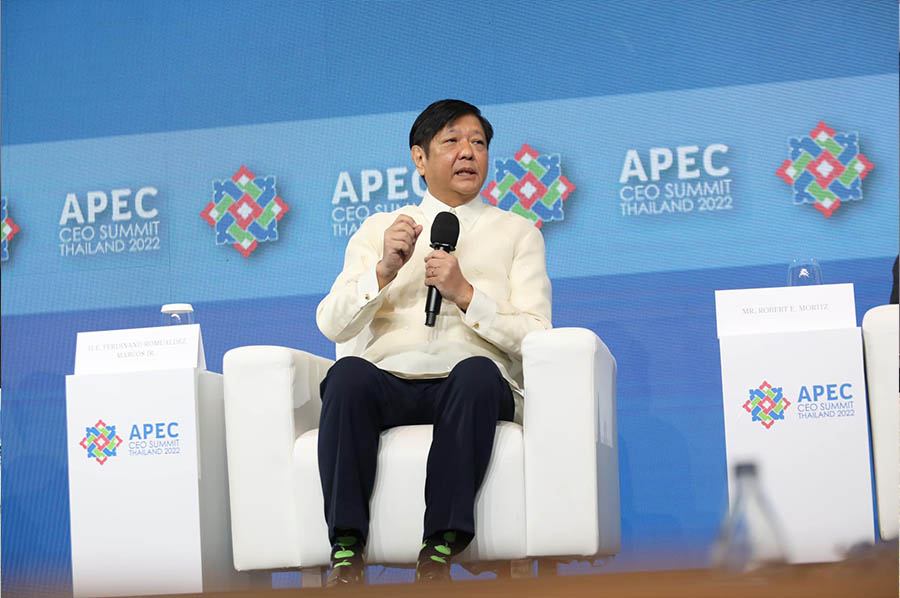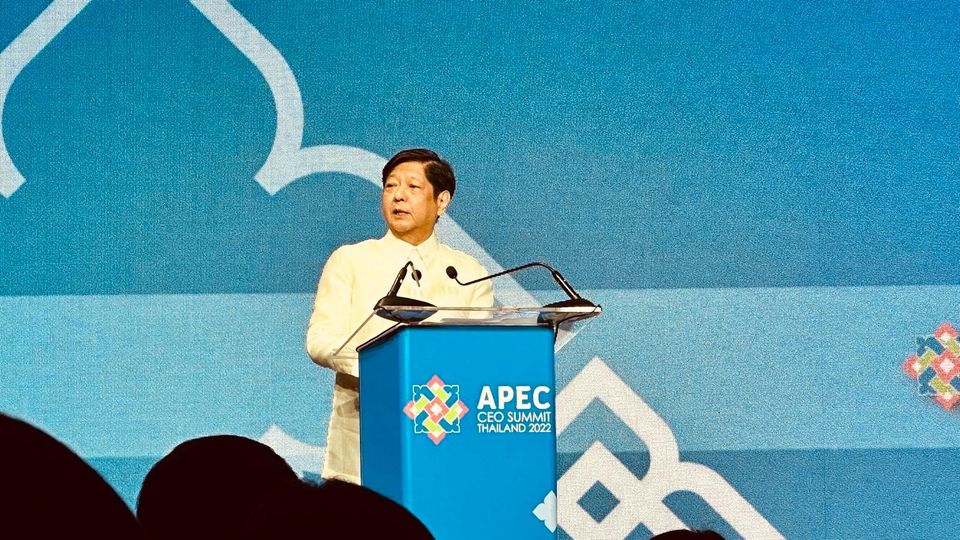Thank you, Secretary Ben Diokno, for your introduction. The members of the Cabinet who have come here [Please, please take your seats.] who have come to join us this evening.
Vice President Sara Duterte; and a member of the Philippine delegation, House Speaker Martin Romualdez; of course, Pasay City Representative Antonino Calixto and Mayor Imelda Calixto-Rubiano, good evening; and the Armed Forces of the Philippines Chief of Staff Lieutenant General Bartolome Bacarro; other major service commanders; the PNP Chief General Jun Azurin; fellow workers in public service; ladies and gentlemen, good evening.
I am very happy that I am able to report the results of the 29th APEC Leaders’ Meeting that I have just come back from in Bangkok.
It was — of course, we discussed with the other leaders all of the issues that our countries have been facing and are facing, and what possible solutions we have for the problems that we see that are upcoming.
And the most important thing that I was able to surmise or to understand from this meeting was very simple that it is very encouraging because the problems as we have identified them seem to be the same problems for most of the countries.
In other words, we have a consonance of views and analyses on the things that are to be of concern.
And furthermore, the solutions for that are things that we now have formulated. Of course, the subject of climate change, the subject of supply chains, the subject of food supply, the subject of digitalization, the empowerment of women. These were some of the issues that were discussed.
And it was a very useful and productive process because as I said, we have now a way forward for all of us members of APEC.
And this includes the United States, it includes the Russian Federation, it includes Australia, Canada, New Zealand.
And so it’s not just the ASEAN, but all of these other countries around the Pacific. So it was really very much a world forum that we could hear from countries from very far apart what are the issues that they are facing that they would like to partner with APEC and with specific countries in solving.
And these are… This is essentially the idea of unity, the idea of as it was — as we refer to it is APEC — ASEAN Centrality.
And that concept seems to be… We are all in agreement that that concept is important for us to be able to face the future, which is going to be rather tumultuous in the next perhaps year.
Besides the Plenary Sessions that we had where we hear from every single member economy, as it is referred to, besides that I had several bilateral meetings. Simply bilateral meetings are meetings that you have direct one-on-one with another leader of another country outside — on the fringes rather of the summit. And that was also very useful because…
In a sense, one of the most important things at least for me was — the reason I thought that I must attend these conferences is that I know now — I have spoken to, I have discussed many issues with all the leaders of our region, of the Asia Pacific.
So they now know me and they know what I’m about — we have discussed things. They know what the Philippine position is on several issues.
And the bilateral meetings that are held on the side of the actual summit, the bilateral meetings are for us to forge stronger relations with different countries up to, as I said once again, France, President Macron was there and we had a very fruitful discussion.
And Canada, which is as you would think was very far away, but nonetheless has involved itself very much in the APEC.
So this kind of partnerships that I have spoken about before, it turns out is also the way forward as the APEC leaders see it.
The bilateral meetings that we had, we were able to tackle specifics in terms of the relationship between our two countries, where we could help each other.
I asked about agriculture. I would ask about energy. I would — depending on who we were meeting.
We were even able to get an agreement from the Kingdom of Saudi Arabia for the payment of the claimants who have not been able to be paid because the pandemic bankrupted their employer. So that is a tangible thing that was as a result of bilaterals.
There are new agreements that we are going to pursue, to develop with Canada and with France, possibly.
There, of course, with the other bilaterals that we had, we were — we are going to — we have been able to again state our country’s positions, and again it has been quite gratifying to see that we are at least…
There are several — to each problem, there were several different approaches. But there was a central principled scientific approach to the different problems that we were — that we were discussing.
The overarching global concern for everyone is and should be global — the climate change issues that are coming.
Every discussion that we had, you can talk about the economy, you can talk about geopolitics, you can talk about anything. You can talk about — you go into detail. You can talk about fisheries, you talk about governance, you talk about anything.
And the subject of climate change will make itself felt. And so again, this is something that we all seem to have realized and we have come together to do — to try to mitigate.
And since we are essentially the — shall we say, since we are essentially the developed countries that have not — cannot be said to have put the world in this situation, the — it is also up to us to go to those developed countries who have had their development.
But unfortunately had — without our… Because we were ignorant of such things, we — they ended up changing the weather in the world. And for them to assist developing countries who have not been a contributor to global warming, to carbon gas emissions, through carbon emissions, and all the other activities that have caused the weather to change and for these disasters to be happening.
So again, that was really the overarching subject. We of course — the economy… You start off talking about the economy, you end up somehow at some point talking about climate change and so I think there will be a very strong push.
The APEC countries have really said that we have many agreements that are in place but there’s very little that has been actually done. And so that is going to be the push by APEC, by ASEAN, by the Asia-Pacific countries.
And then before we left, we of course, managed to meet with the Filipino community in Bangkok.
We had a very enthusiastic crowd and as ever, it was — after all the serious and very important discussions, it was a breath of — it’s always a breath of fresh air to spend time with fellow Pinoys around the world.
So that essentially — these are the broad strokes of the trip that we have just come back from. And there’s much that we can start to develop because one of the — some of the bilaterals were with private corporations. We were entertained by private corporations who want to invest in the Philippines.
So those are the things that we have to follow up. We have much to do to play our part in APEC and we will undertake all that so that we will contribute to the success of this region.
Because the ultimate, in terms of the economies, the ultimate aspiration is for the APEC region, Asia-Pacific region to return to its old role as a driver of the global economy.
And if we do all of the things that we are planning to do, that will come back again. And we once again will be at the forefront of the global economy.
So that is what we are working towards and that is what we had tried to develop in Bangkok.
Thank you very much and good evening. [applause]
— END —
Location: Maharlika in Villamor Air Base in Pasay City




